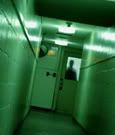The labeling of movies as "flops" and such has long been sticky issue for me, no matter where in the world it happens, and I tend to avoid it in my own writing, unless I know there's proof out there. I haven't checked the box-office for all the Jackie Chan movies of that era, for example, so perhaps DRAGON LORD wasn't as strong a performer as some of his other films of the period, but indeed, HK$17 million (actually closer to $18 million as I see now) is nothing to sneeze at, no matter whether it's in "today" dollars or 1982 dollars, and it represents a sizable number of people
paying to see the film in theatres. Granted, LOOKING FOR MR. PERFECT can't hold a candle to DRAGON LORD, but few Hong Kong movies in 2003 could,. Look at the state of Hong Kong's
industry circa 2003; I doubt there are many pictures that even cracked the HK $10 million mark. This is not to say that MISTER PERFECT, with it's HK $1 million-plus haul, was a runaway success, it wasn't. But I think it needs to be placed in context; otherwise, nearly every film released would likely be considered a flop (at least by Charles' measure, and he actually
liked this one to a certain degree!)
I have no problem with someone labeling a movie a
critical flop, as those are a dime a dozen, then as now, although today, too many people (for my liking) seem to think that internet fan reaction and blog reviews should be lumped in with professional critical analysis when deciding whether a film is a
critical smash or a
critical disaster, but there's simply too much amateur commentary out there these days for anyone to seriously consider it part of a
true critical consensus, as it invariably runs the spectrum from "horrible" to "unmitigated classic" no matter what the film. It's no less important in its own way, but it's rarely written by film scholars or people with long histories of studying the form. Pre-internet, "critical consensus" was, if I recall correctly, widely held to be a sort of aggregate position on a film based on the available, professional reviews for it, which might lean pro, or lean con, or even fall somewhere in the middle, but usually written by people who did it for a living.
But when it comes to
box office disasters in a film industry like Hong Kong's, how can one adequately measure such a thing? There are movies in the DB from the 2000's (maybe even 2003) that have box office tallies under HK$10,000. Decent films, weak films, shot-on-video stuff, many with decent casts and serious ambitions, you name it.
And they played in theatres. Sure, some such films might have only screened in one or two theatres, and for only a few days, just so the producers could say their film got a theatrical release, but the fact remains that they
did play on the big screen, and they made a hell of a lot less money than MISTER PERFECT, but that film, in John Charles' estimation, is an abject financial bomb.
I also don't doubt that SARS played some role in keeping people out of theatres, but obviously 15,000 of them chose to see this one on the big screen in the city near the height of a major international health crisis, which is why I'm curious to see box office tallies for other films during those same months. I have a feeling that movie houses in Hong Kong weren't sitting idle, even if attendance understandably declined from numbers that probably weren't exactly stellar to begin with. Barely two months earlier, BLACK MASK 2, a comparative critical bomb often tied to MISTER PERFECT because both became sort-of debut vehicles for Andy On, attracted nearly three times the viewers, but it did have a "franchise" behind it, as well as a much higher concept, so it was probably to be expected.
Does any of this make MISTER PERFECT an unqualified success? Of course not. But I'd be curious to know it's budget, and how much it was earned back from that modest theatrical release and eventual DVD/VCD sales (meager though they may be,
some copies must have sold). If the thing turns out to have cost HK$20 million to make, then HK$1 million at the box office is a very poor showing, but it just doesn't look like it cost that much. The locations were like provided in contra by the Malaysian resort for a feature length commercial, and the opening sequence in Hong Kong doesn't exactly look like it would cost a fortune to stage.
I've been wanting to ask this question for ages: where does this database get its Box Office figures? Are we using multiple sources? Why don't we have more information flagged.
I've wondered about this myself. I've generally assumed it comes from HKFA or some other such reliable source. Variety keeps track of Hong Kong box-office statistics to this day, but I doubt that's where we get our information (though we probably could, as we're missing it for a LOT of recent movies):
http://www.variety.com/index.asp?layout ... ong%20Kong.


